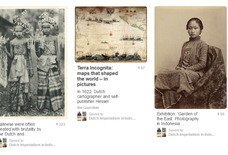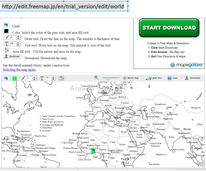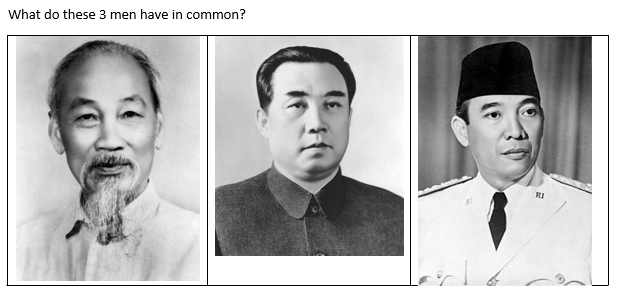This section focuses on the impact of European and American imperialism and colonialism upon the indigenous societies and political systems of South-East Asia. It analyses the reasons for expansion into this area and the nature and effects of colonization. Similarities and differences between colonial systems and the responses of the colonized peoples to the colonizers should be assessed, along with the factors that led to the beginnings of nationalism. The section concludes by assessing the extent to which these countries had developed a national identity by the outbreak of the First World War.
Topic A: THE DUTCH IN INDONESIA
Key Content:
- Political structure and the economic, social and cultural effects of the Dutch colonial system in Indonesia: culture system; liberal policy;
- Decline of the Dutch East India Company (VOC); increasing Dutch state control and the introduction of the Ethical Policy (1901)
Here are some basic overview notes if you get confused. Feel free to augment them for yourself.
- Political structure and the economic, social and cultural effects of the Dutch colonial system in Indonesia: culture system; liberal policy;
- Decline of the Dutch East India Company (VOC); increasing Dutch state control and the introduction of the Ethical Policy (1901)
Here are some basic overview notes if you get confused. Feel free to augment them for yourself.
| notes_on_indonesia_for_students.docx | |
| File Size: | 18 kb |
| File Type: | docx |
| indonesia_church_text.pdf | |
| File Size: | 404 kb |
| File Type: | |
READING FOR HOME LEARNING OVER FOUR LESSONS.
Use these articles for more detail and essay planning.
Use these articles for more detail and essay planning.
| coolie_labour_article_jc_breman.pdf | |
| File Size: | 1118 kb |
| File Type: | |
| dutch_policies_in_indonesia.pdf | |
| File Size: | 4030 kb |
| File Type: | |
| the_cultivation_system_and_liberal_policy.pdf | |
| File Size: | 2040 kb |
| File Type: | |
| coolie_ordinance_article.docx | |
| File Size: | 785 kb |
| File Type: | docx |
Good quick summary:
| lockhard_indonesia_pp93-97.pdf | |
| File Size: | 2860 kb |
| File Type: | |
Decent summary:
| sardesai_indonesia_pp79-89_147-151.pdf | |
| File Size: | 10652 kb |
| File Type: | |
Good detail:
| hall_pp580-591_613-624_789-797.pdf | |
| File Size: | 20398 kb |
| File Type: | |
An alternate perspective:
| osbourne_indonesia_pp70-72_83-85.pdf | |
| File Size: | 4477 kb |
| File Type: | |
Interesting comments about Kartini and "feminism":
| lockhart_kartini_the_feminist_p128-129.pdf | |
| File Size: | 1111 kb |
| File Type: | |
Here is some information about Tirto Adhi Suryo and his contributions to nationalism:
| tirto_adhi_suryo_a_father_of_indonesian_nationalism.docx | |
| File Size: | 638 kb |
| File Type: | docx |
1. Getting an Overview: What were the key features of the early development of the colonial system in Indonesia?
DOWNLOAD THIS OVERVIEW SHEET (You will use it to record your learning over the next few lessons)
| overview_grid.docx | |
| File Size: | 87 kb |
| File Type: | docx |
|
a) Tuning in to the period
i) Go to Ms van Dorsselaer’s Pinterest board about Dutch Imperialism in Indonesia Add some pictures if you can or browse the ones that are there, or make your own. What can you say from these pictures about the nature of Dutch Imperialism in Indonesia? Discuss in groups. Feedback to class. |
|
b) Map activity
We are going to use a new tool in order to create editable maps on line. Your goal here is to use the pdf resource to create a map of World Empires by 1895. Download and save to your Google Site. Use the link opposite. What conclusions can be drawn about the balance of power and relative importance of the different areas we will be studying (Indonesia, Philippines, Thailand, Vientam/Camboadia/Laos) |
| |||||||
c) Identifying early Dutch attitudes to Indonesia. Use thus “Early Dutch attitudes to colonialism in Indonesia” handout. Use it to fill in Box 1 of “Overview” grid.
| early_dutch_colonialism_in_indonesia.docx | |
| File Size: | 14 kb |
| File Type: | docx |
|
d) Watch this short video to get an idea about the cause, nature and effect of the Dutch Empire around the world. Make some notes about cause, nature and effect as you watch. The youtube link is: https://www.youtube.com/watch?v=xSIyIzfbYoo
|
|
|
|
e) Print off copies of the mystery cards. Enough for 1 sheet per 2 or 3 people. Students cut out and order relevant points to answer the question “How did the French Revolution affect Dutch Colonialism in Indonesia?” Write down the list of relevant points and the answer to the question.
|
| ||||||
Lesson 2: What was the VOC, how did it affect Indonesians through its operation and decline?
1. Gaining the key points:
|
|
| ||||||
2. Fitting into the big picture: Refer back to your 'overview' grid from last lesson - complete Box 2.
3: How did Dutch State control increase after 1816?
a) What was the “Culture/ Cultivation System” (1830-1870) and its effects?
1. Read the extract “Rust en Ordre”. Discuss the nature and effects of the Culture system on Dutch, Indonesian elite and labourers.
2. Read the “Culture System Cowie” sheet and do it completely (including filling in Box 3 of the “Overview” grid)
3. Go to: https://www.rijksmuseum.nl/en/explore-the-collection/timeline-dutch-history/1820-1950-indonesia-and-decolonisation . Find the section on the “Cultivation System” Policy. Add to Box 3 on “Overview grid”. If the Rijksmuseum link doesn't work, type in Indonesian history Timeline and you should be able to access the site from there.
2. Read the “Culture System Cowie” sheet and do it completely (including filling in Box 3 of the “Overview” grid)
3. Go to: https://www.rijksmuseum.nl/en/explore-the-collection/timeline-dutch-history/1820-1950-indonesia-and-decolonisation . Find the section on the “Cultivation System” Policy. Add to Box 3 on “Overview grid”. If the Rijksmuseum link doesn't work, type in Indonesian history Timeline and you should be able to access the site from there.
|
| ||||||||||||
3.b) How did Dutch State control increase after 1816? What was the “Liberal Policy” (1870-1900 circa) and its effects?
NB: When considering effects we are ALWAYS looking at political structure, economic, cultural and social effects.
Read handout about “Liberal policy”. Do discussion. Fill in Box 4 on “Overview grid”.
Read handout about “Liberal policy”. Do discussion. Fill in Box 4 on “Overview grid”.
| liberal_policy_cowie.docx | |
| File Size: | 15 kb |
| File Type: | docx |
c) How did Dutch State control increase after 1816? What was the “Ethical Policy” (1900- 1930s) and its effects?
|
1. Watch this video to get an idea about the cause, nature and effect of the Ethical Policy. The first 9 minutes are most useful. The link is:
https://www.youtube.com/watch?v=AqHcyAj-Mz0 Answer these questions: a) Did the Dutch really control Indonesia? b) How did Dutch "indirect rule" work? c) What was the Cultivation System and its effect? d) What happened in the 1870s? e) Explain the start of Imperialism and what caused it? f) What was the Ethical Policy and its Effect? |
|
2. Go to: https://www.rijksmuseum.nl/en/explore-the-collection/timeline-dutch-history/1820-1950-indonesia-and-decolonisation . Find the section on the Ethical Policy. Fill in Box 5 on “Overview grid”.
3. Go to: http://sejarahmodern.weebly.com/the-dutch-ethical-policy.html . Read the information and do the tasks (copy of this also saved in the folder).
4. Augment your notes on the Culture system, Liberal and Ethical policies by doing the wider reading below.
|
| ||||||
|
Watch this "History of Indonesia in 12 minutes" video. The link is: https://www.youtube.com/watch?v=PA7gFnYfBqo.
Minutes 4 to 8 are most relevant to us. Make notes about the VOC, the Culture System, the Liberal Policy and the Ethical Policy as you watch. |
|
4. What were the beginnings of nationalism in Indonesia? Who led, what were their ideas and motivations, how successful were they?
1. Go to: https://www.rijksmuseum.nl/en/explore-the-collection/timeline-dutch-history/1820-1950-indonesia-and-decolonisation . Find the section on the “East Indies Lost, at what cost”. Fill in Box 6 on “Overview grid”.
2. Read http://sejarahmodern.weebly.com/impact-of-the-russian-revolution-the-birth-of-indonesian-communism.html . Answer the questions orally in groups, then individually write a proper PEA paragraph about the birth of Indonesian communism/ nationalism. Have a topic sentence which deals with the communism versus nationalism distinction. Or do the paragraph for homework.
3. Reread Source A in http://sejarahmodern.weebly.com/impact-of-the-russian-revolution-the-birth-of-indonesian-communism.html . Give 3 reasons why Lenin says Indonesian nationalism/ communism is awakening.
Compare the interpretations of why nationalism developed in the sources you just read to the interpretations presented here: http://sejarahmodern.weebly.com/development-of-nationalism-amongst-elite-groups.html
Fill in Box 6 completely.
Summary
From your notes and the notes provided and your textbook, fill in the following table:
Beginnings of Nationalism: Causes
Beginnings of Nationalism: Nature
Beginnings of Nationalism: Effects (National Identity by 1914?)
Use the “notes on Indonesia for students” at the top of this section to help you. Also look at these 2 sites:
http://sejarahmodern.weebly.com/impact-of-the-russian-revolution-the-birth-of-indonesian-communism.html
http://sejarahmodern.weebly.com/development-of-nationalism-amongst-elite-groups.html
Look up groups mentioned in the school’s Britannica Database too.
In pairs or 3s, create a “tension” graph with years and events on it to sum up Dutch colonial system political, social, cultural effects. A tension graph is a line graph which shows years and events on the axes, and it allows you to chart the rising/ falling of tension in a situation. Sum up this Indonesian section overall, using all you have learnt, including the graph.
2. Read http://sejarahmodern.weebly.com/impact-of-the-russian-revolution-the-birth-of-indonesian-communism.html . Answer the questions orally in groups, then individually write a proper PEA paragraph about the birth of Indonesian communism/ nationalism. Have a topic sentence which deals with the communism versus nationalism distinction. Or do the paragraph for homework.
3. Reread Source A in http://sejarahmodern.weebly.com/impact-of-the-russian-revolution-the-birth-of-indonesian-communism.html . Give 3 reasons why Lenin says Indonesian nationalism/ communism is awakening.
Compare the interpretations of why nationalism developed in the sources you just read to the interpretations presented here: http://sejarahmodern.weebly.com/development-of-nationalism-amongst-elite-groups.html
Fill in Box 6 completely.
Summary
From your notes and the notes provided and your textbook, fill in the following table:
Beginnings of Nationalism: Causes
Beginnings of Nationalism: Nature
Beginnings of Nationalism: Effects (National Identity by 1914?)
Use the “notes on Indonesia for students” at the top of this section to help you. Also look at these 2 sites:
http://sejarahmodern.weebly.com/impact-of-the-russian-revolution-the-birth-of-indonesian-communism.html
http://sejarahmodern.weebly.com/development-of-nationalism-amongst-elite-groups.html
Look up groups mentioned in the school’s Britannica Database too.
In pairs or 3s, create a “tension” graph with years and events on it to sum up Dutch colonial system political, social, cultural effects. A tension graph is a line graph which shows years and events on the axes, and it allows you to chart the rising/ falling of tension in a situation. Sum up this Indonesian section overall, using all you have learnt, including the graph.
5. Summing up and consolidating
Now we have looked at all aspects of this period, here is a documentary that provides an overview of the areas in which we are particularly interested: the VOC, the Culture System (1830-70), the Liberal Policy (1870-1900) and the Ethical Policy (1901-1930-ish) and the rise of Nationalism.
This is a Dutch Documentary called the "Dutch East Indies 1602-1949 Part II". Watch it using the accompanying worksheet which provides prompts for you to make notes about as you go. It uses subtitles rather than narration to convey its information. The youtube link is on the worksheet if you need it.
This is a Dutch Documentary called the "Dutch East Indies 1602-1949 Part II". Watch it using the accompanying worksheet which provides prompts for you to make notes about as you go. It uses subtitles rather than narration to convey its information. The youtube link is on the worksheet if you need it.
|
| ||||||


